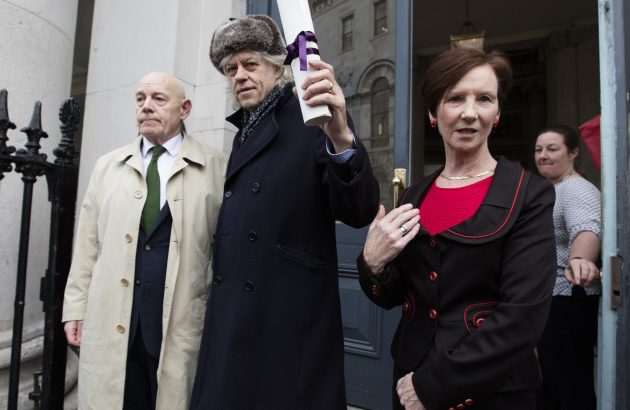‘So are they all, all honourable men’
The controversy that has been aroused by Bob Geldof (or should that be Sir Bob?) handing back his deed as Honorary Freeman of the City of Dublin at the City Hall has focused public attention on just what this title is.
Turning as I always do to the books on my shelves, I find that though the title is not much discussed in the heavier more academic tomes that now abound about the city’s millennium of existence, these lauded few are listed in the older editions of Thom’s Directory (of the kind so vital to all research into all matters relating to Dublin), and in the pages Fr Eddie O’Donnell’s always useful Annals of Dublin, illustrated by finely printed images of Fr Frank Brown, in which is printed the “Roll of the Honorary Freemen of the City of Dublin”.
The city may be far more than a thousand years old, but this title is quite modern – in the historian’s sense, that is – for it dates only from 1876.
Parliament (that is to say Westminster) had passed an Act that enabled Dublin City Council “to elect and admit persons to be honorary burgesses”. This was rather in imitation of a medieval custom of admitting people to be “free citizens”, who were presented then with a key to the city gates.
This Victorian act can be seen as part of a general movement across these islands for the rapidly enlarging (often heavily industrialised cities such as Manchester or Glasgow) to give themselves grander airs with respect to London’s.
The Irish nationalists who then controlled the city council (from time to time) at once admitted Isaac Butt, the leader of the Irish Independent Party (1876), W. E. Gladstone , then the darling of the Irish (1877), and Ulysses S. Grant, the former President of the USA who was touring the world (1878).
So much for the great, but the fourth freeman was one of the good. This was Captain Edward E. Potter, commander of the Relief Ship Constellation. Capt. Potter had carried supplies of food to the famine struck West across the Atlantic, laying off aid at the villages along the coast as he sailed northwards in 1879-80. He was admitted at the end of his work as a special mark of honor (26 April 1880).
Capt. Potter represented the sort of person that one might expect to be honored today for their charitable works, as was Bob Geldof in due course.
However, when one goes down the list one can see that those marked out were overwhelmingly political public figures, or people who were once celebrities of some kind or another.
Hopes
Some are now little known. Coming upon their names, many would ask who was Ehrenfried Gunther Baron Hunefeld and Captain Herman Köhl in June 1928. Yet all was made clear by the next name, Major James Fitzmaurice. These were the fliers who conquered the Atlantic, raising Ireland’s hopes of being a major player in international flight.
But there were also a fair number of genuine – and deserving – Dublin talents, people such Edwards/Mac Liammóir, Noel Purcell, and Maureen Potter and many others who were genuinely popular. (And doubtless T. D. Sullivan, one of the founders of this paper, deserved his tribute in 1887 – if only because he was one of the great ballad writers of the day…)
Yet on the whole one takes away the impression of one lot of politicians rewarding another lot. Given the fact that so many politician have many human failings, and often have feet of clay, it is hardly surprising that now and again some embarrassment should arise over those chosen. But we cannot worry about the past.
But one feels today that if Bob Geldoff wants to do something about the situation in Myamar he could begin here at home, and apply himself to achieving reconciliation between the Buddhist Burmans in Ireland and their Muslim compatriots the Rohingya – who are rejected by them as ‘Bengalis’. At present neither group in Ireland speaks to the other. Step into the gap, Sir Bob? But don’t insult Dublin and Dubliners instead.


 Peter Costello
Peter Costello Sir Bob Geldof prepares to hand back his deed as Honorary Freeman of the City of Dublin
Sir Bob Geldof prepares to hand back his deed as Honorary Freeman of the City of Dublin 